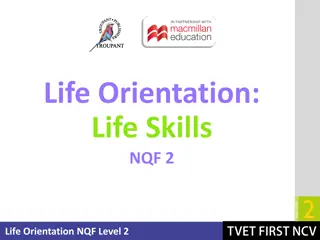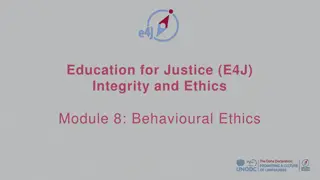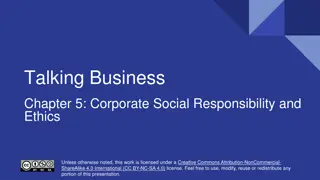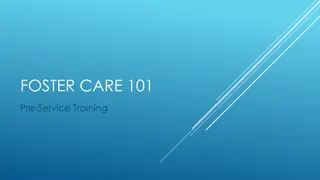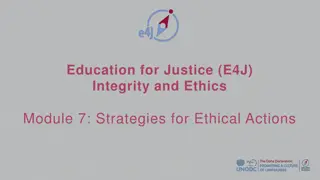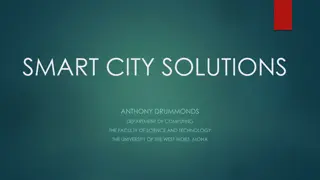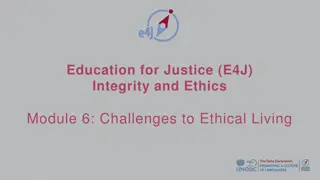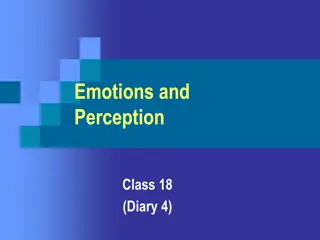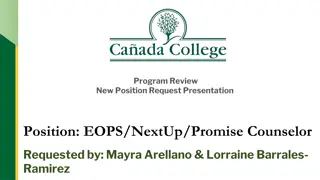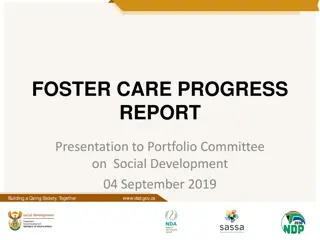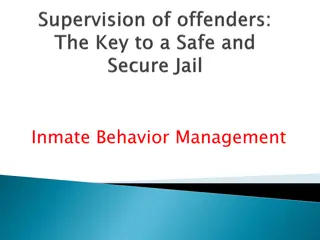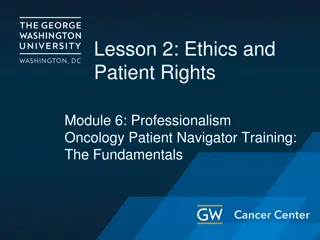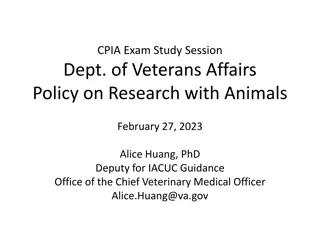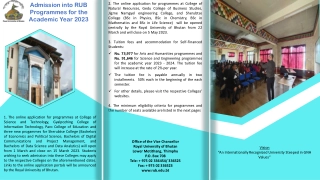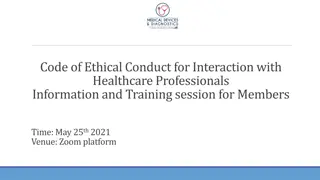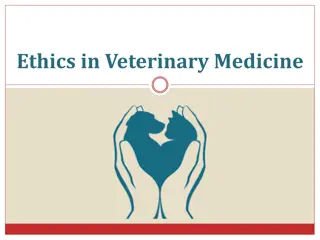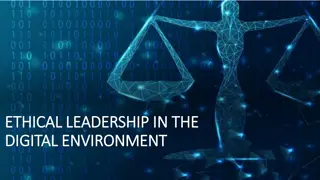Smart Ways to Protect the Environment and Foster Ethical Behavior in College
Making simple changes in daily routines can help protect the college environment, such as saving water, switching to reusable products, reducing paper waste, and recycling. Additionally, incorporating ethical and moral behavior, including values like respect, honesty, and fairness, is crucial for creating a positive college environment.
Download Presentation

Please find below an Image/Link to download the presentation.
The content on the website is provided AS IS for your information and personal use only. It may not be sold, licensed, or shared on other websites without obtaining consent from the author. Download presentation by click this link. If you encounter any issues during the download, it is possible that the publisher has removed the file from their server.
E N D
Presentation Transcript
LIFE ORIENTATION LEVEL 2 TOPIC 4 CITIZENSHIP S.P. MKHWANAZI HARRISMITH CAMPUS
WAYS TO PROTECT THE ENVIRONMENT AT COLLEGE Living in a reckless world in which we are often in a hurry, striving to be eco-friendly seems to require extra effort when in reality it does not! Here are smart changes you can make in your regular routine that can help protect the college environment. Make sure that the tap is properly turned off at all times. o Save water and do not leave the water nozzle running. Saving water and being conscious of your water usage in general can mean helping to conserve clean water, an invaluable resource we all depend on to live. Rely on re-usable products o Switch from plastic to reusable containers and bottles. Whether it be to pack your lunch or other things you are carrying with you on campus, you can limit waste by using reusable containers.
Reduce paper waste o Try to get digital textbooks and consider printing double-sided when you do use paper. Switch off, unplug, and save o Unplug chargers and turn off lights that are not being used. Many electronic appliances continually consume electricity simply by being plugged in. Make sure to turn off the lights in the classrooms, air conditioner and computers when you are not using them . Recycle o Recycling is one of the easiest ways to go green. Simply separate paper, bottles and cans from your other trash. If you are really committed to the environment, you can even manure recyclable materials. Start Volunteering o You can make an impact on the college environment by getting involved with local aids and assisting in the college municipal.
Ethical and Moral Behaviour Ethical behaviour - is the application of moral principles in a given situation. It means to behave according to the moral standards set by the society which we live in. Acting in ways consistent with what society and individuals typically think are good values. Ethical behaviour involves demonstrating respect, it spectacles for key moral principles that includes honesty, fairness, equality, dignity, diversity and individual rights. Moral behaviour - means to act according to one s moral values and standards. Children demonstrate prosocial and moral behaviour when they share, help, co-operate, communicate, sympathize or in otherwise they demonstrate ability to care about others. Morality can be a form of standards or principles derived from a code of conduct from a particular philosophy, religion or culture, or it can derive from a standard that a person believes should be universal.
Ethical values are the ones we make ethical choices based on, or they are the kind of values that have to do with being good or doing the right thing. There are many ethical values. Justice, honesty, empathy, compassion, respect and responsibility are the most important ones. Ethical behaviour in college o Ethics are well founded standards that make the actions right and wrong. They help categorize the different values such as integrity discipline and honesty among others and apply them in daily lives. o Ethics influences behaviour and allows an individual to make the right choices.
Responsibilities and duties of college students with reference to bursaries and other funding o It is the duty of the student to submit all the required information to funding, making sure that all information is correct and available. Also to update the information when necessary. o Students need to take active role in their learning, they need to demonstrate academic integrity and honesty. o Attend and participate in class, prepared and on time so they can sign the attendance register which act as proof of their attendance. o Complete the assigned work in a timely manner with attention to quality of work.
The need and importance of volunteering in the community Volunteering is to freely offer to do something, or work for an organization without being paid. Volunteering is generally considered a noble and humane activity where an individual or group of individuals generously give time to benefit another person, community or an organization. Benefits of volunteering in the community o Volunteering allows you to connect to your community and make it a better place. Even helping out with the smallest tasks can make a real difference to the lives of people, animals, and organizations in need. o It helps you connect better with other members of the community. o Volunteering is good for your mind and body and it can advance your career. o Volunteering brings fun and fulfilment to your life and it increases self-confidence. o Volunteering can provide a healthy boost to your self-esteem and life satisfaction. You are doing well for others and the community, which provides a natural sense of accomplishment. Your role as a volunteer can also give you a sense of pride and identity.
Community volunteering project You need to: o Look over your interests: Which activities seem most appealing to you? Were they mostly in one particular category, like children or the environment? If so, that's a good starting place for choosing specific organizations to contact. o Figure out how much time you can devote to community service. Are you available for two hours every week? Are you not free on a regular basis but can volunteer for an entire weekend now and then? o Think about transportation as well and how you'll be able to get to different locations. Knowing this information will help you choose which community service projects to pursue, and it is helpful information for volunteer coordinators to know. o Do some research to see what projects you can do in your community: Check at your school, place of worship, or town hall for more information on volunteering? You can also contact the place where you'd like to perform your community service, such as a particular animal shelter or nursing home and ask if they take volunteers. o Start volunteering! This list ranges from small projects that you can complete on your own in a few hours, to much larger projects that will take more time and people. If you find a project you can start on your own, do it.
Teamwork and leadership skills What is teamwork? o Teamwork is the collaborative effort of a group to achieve a common goal or to complete a task in the most effective and efficient way. This concept is seen within the greater framework of a team, which is a group of interdependent individuals who work together towards a common goal. o Effective leaders have the ability to communicate well, motivate their team, handle and delegate responsibilities, listen to feedback, and have the flexibility to solve problems in an ever-changing workplace o Communication o One of the most important skills of a leader is the ability to communicate effectively. While the ability to strategize is also crucial, strategies are nothing without a team that understands how to carry them out. It is a leader s responsibility to ensure that the team both understands the tasks at hand and is motivated enough to give it their full attention.
o Awareness o A strong leader should also have an eye on the professional process to learn which ideas are effective and which less so. o Honesty/Integrity o Great leaders are not exclusively those who solely get results. Rather, leaders must also command respect and trust by being forthright with their employees and the greater industry of which they are a part.. Ideally, a strong leader should also possess the ability to deliver harder truths diplomatically so as not to alienate workers. o Relationship Building o For some people, it may seem like business is primarily about some form of production. However, production can proceed more efficiently when team members trust and work well with each other.. o Innovation o An innovative leader is someone who takes responsibility for these obstacles and creates a path toward bringing the work back to its intended expectation. o Developing Leadership Skills o It is sometimes said that great leaders are born, not made. While some people do undoubtedly contain a certain ability to connect with and inspire others, leadership skills can also be nurtured and developed. o By learning to listen, to take initiative, to understand when your instincts should be trusted and to discipline yourself, you stand to improve your role as a leader. The skills mentioned in this article are, additionally, those that can benefit from practice and training, allowing anyone cast in a leadership role to excel in his or her position.


